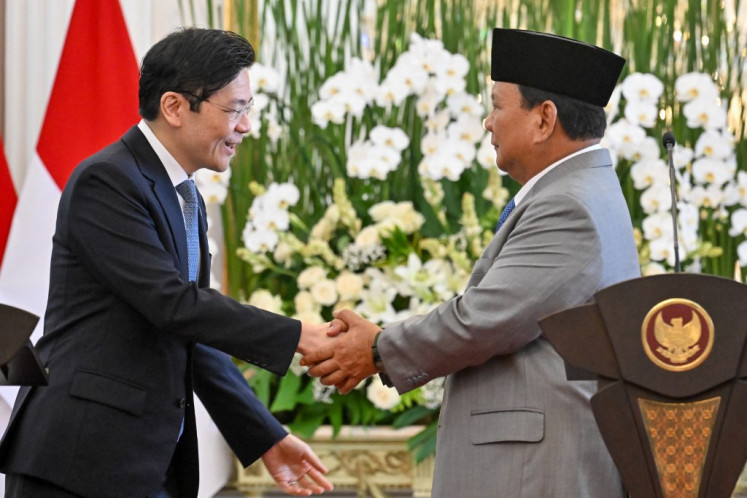Recycling alone insufficient to reduce plastic waste: Greenpeace
Amid growing sustainability concerns over industrial plastic waste, the latest study by environmental watchdog Greenpeace International has found that major global consumer goods manufacturers still lack viable guidelines and actionable policies to reduce the production of single-use plastic packaging
Change text size
Gift Premium Articles
to Anyone

A
mid growing sustainability concerns over industrial plastic waste, the latest study by environmental watchdog Greenpeace International has found that major global consumer goods manufacturers still lack viable guidelines and actionable policies to reduce the production of single-use plastic packaging.
Furthermore, the study found that the fast-moving consumer goods sector was one of the biggest contributors of plastic waste worldwide.
Greenpeace Indonesia global plastics project leader Ahmad Ashov said major companies in the consumer goods sector, including those operating in Indonesia, had falsely assumed that the plastic they had previously used to package their products could be instantly recycled and reused as new packaging.
“Their whole business model is based on such a misleading notion of recycling. However, in reality, only 2 percent of the 141 million tons of global plastic waste in 2015 were effectively recycled,” Ahmad said at the launch of the report in Jakarta on Tuesday.
He added that recycling alone had not been sufficient to resolve the environmental crisis.
According to Ahmad, many major companies, which had previously promised to limit plastic waste, have yet to take concrete steps to follow up on their stated commitments.
The report aims to debunk the recycling myth, which it found to be ineffective.
The report found that only 9 percent of global plastic waste have been recycled, with the recycling rate in developed countries with more advanced waste management systems barely reaching 50 percent.
“This is why we have been pushing for alternative product delivery options, which will hopefully render the need for plastic packaging irrelevant,” Ahmad said.
Among the proposed alternative product delivery methods are public beverage dispensers that customers can use to fill their own drinking bottles.
Several companies have conducted trial runs to test the viability of such an alternative business approach, but unfortunately the idea had yet to be widely implemented, Ahmad added.
Indonesia itself is among the largest contributors of plastic waste in the world.
A representative from leading consumer goods manufacturer Unilever Indonesia said the company had issued a Unilever Sustainable Living Plan, along with a target to reduce half of its plastic waste by 2020.
According to its sustainability report, the company had managed to reduce its existing plastic waste from 2010 by 29 percent last year through its cooperation with 2,165 waste banks that have collected 6,125 tons of organic waste. The report said the company had implemented a new plastic production method that was capable of recycling plastic sachets.
Erwin Ciputra, the president director of one of the country’s leading producers of plastic, PT Chandra Asri Petrochemical (CAP), said the company had implemented various alternative methods to repurpose plastic waste.
“In addition to recycling, CAP has implemented other sustainable methods such as plastic asphalt to help reduce the country’s plastic waste. We recycled 2 million plastic bags and used them in our asphalt mix to pave the road in our factory complex in Cilegon, Banten,” Erwin said.
Indonesian Olefin, Aromatic and Plastic Industry Association (Inaplas) chairman Edi Riva’i said recycling remained crucial to reducing the country’s plastic waste.
However, he added, more advanced plastic waste management was needed to improve recycling in the country.
“There needs to be a standardized design for plastic packaging, such as the minimum thickness of plastic bags, so they can be recycled more effectively,” Edi said, adding that giving up plastic packaging should not be an option because plastic had been a profitable commodity.









